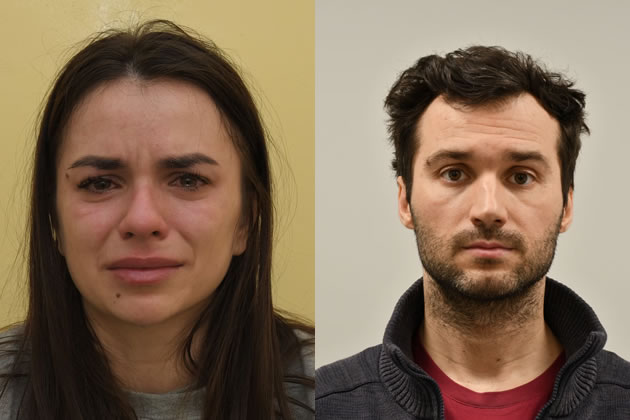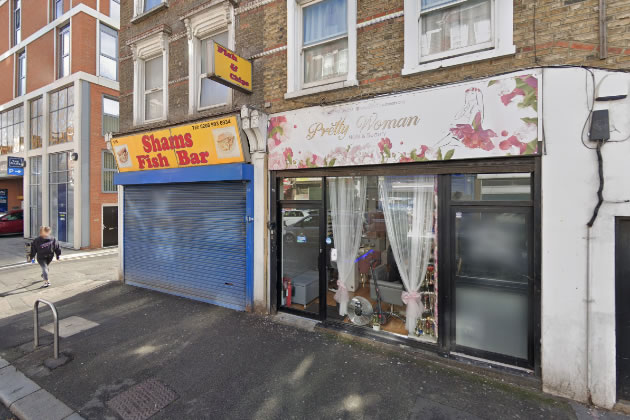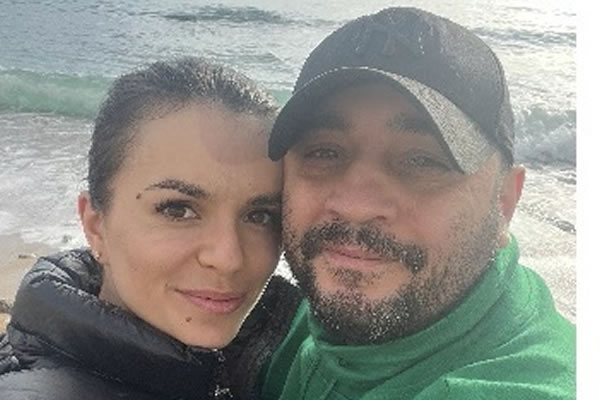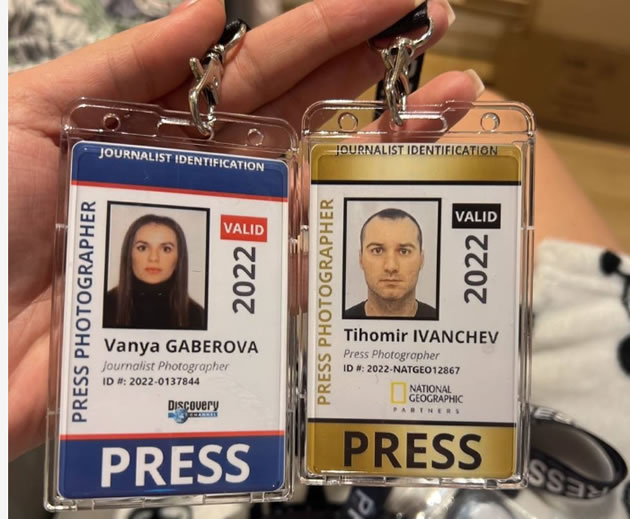Acton Members of Russian Spy Ring Jailed
Vanya Gaberova and Tihomir Ivanchev set up Churchfield Road beauty salon

Vanya Gaberova (left) received six years and Tihomir Ivanchev (right) got eight. Picture: Met Police
May 12, 2025
The manager of the Pretty Woman salon on Churchfield Road and the man who had paid for it and fitted it out have both received jail sentences for spying for Russia.
They were members of group of six Bulgarians living in the UK who received sentences totalling more than 50 years f ollowing a three-month trial at the Old Bailey.
30-year-old Vanya Gaberova, who had won awards for her work as a beautician, was sentenced to six years, eight months and three weeks' imprisonment. The jury had failed to buy her argument that she had been duped into working for an espionage operation by one of her lovers who told her that the missions she had been sent between 2020 and 2023 on were on behalf of Interpol investigating corruption.
Prosecutors presented compelling evidence that Gaberova was involved in multiple covert operations targeting individuals and locations of interest to the Russian state. Her defence that she was unaware of who the people were that she was being asked to follow was not credible as a simple internet search would have revealed that they were prominent critics of the Kremlin. The group used advanced surveillance equipment, including hidden cameras and jamming devices, and operated under false identities. They compiled detailed reports on their targets and were compensated for their activities . Part of the evidence against Gabarova was a picture of herself she inadvertently took with one of the spy cameras she was given to use.

Pretty Woman on Churchfield Road. Picture: Google Streetview
One notable operation involved attempting to lure journalist Christo Grozev into a fake relationship, a tactic known as a "honeytrap." Grozev, known for his investigative work on Russian intelligence, but the plot never got any further than him accepting a Facebook friend request from Gabarova.
39-year-old Tihomir Ivanchev, a painter and decorator, from Acton was sentenced to eight years' imprisonment. He had previously been in a relationship with Gabarova and took out a loan to help her set up the Churchfield Road salon and worked converting it for her. His reward was to be dumped in favour of 43-year-old Bizer Dzhambazov, a more senior member of the spy group who was also in a relationship with another member of the gang, Katrin Ivanova. He explained his regular absences to both women on needing treatment for brain cancer although pictures of himself which he took to convince him clearly show he had wrapped his head in toilet paper rather than bandages. The couple naked was in bed together when the police launched a dawn raid on the address they were staying at which point Gabarova asked Dzhambazov, “What have you done?”

Gaberova and Dzhambazov on a beach in Montenegro during a spying mission. Picture: Met Police
Ivanchev wasn’t arrested during the initial raids on the gang but later that day visited the flat of Gaberova. He gave his details to the police officers who were still there and further enquiries revealed previous concerns relating to possible espionage activities. He was later arrested but, during his police interview, he chose to answer questions without legal representation claiming to have been unaware of the group's true intentions, stating that he believed he had been "chasing bad guys." He also mentioned that Dzhambazov, had introduced himself as an Interpol agent. However, evidence was presented at trial that proved he could not have possibly been unaware that he was working for Russia.

Fake press passes used by Gaberova and Ivanchev to get access to targets. Picture: Met Police
The court heard that detectives from the Met’s Counter terrorism Command seized hundreds of items after a co-ordinated series of raids and arrests were carried out on 8 February 2023.
In particular, a 33-room former hotel in Great Yarmouth belonging to 46-year-old Roussev was found to contain items including sophisticated spying equipment such as listening devices, concealed cameras and a fake ID card printer.
Through their investigation, detectives identified that Roussev, who was leading the group, was in direct contact with Jan Marsalek - an Austrian national who, in turn, was identified as working with the Russian intelligence services. Marsalek had previously been a director of Wirecard, a financial technology company, which at its peak was one of the largest in Germany before corruption was discovered and it collapsed.
The investigation team identified six core spying ‘plots’ the group were involved in. This included activity that targeted two investigative journalists who were seen as reporting stories contrary to the interests of the Russian state.

Vanya Gaberova before she was caught. Picture: Vanya Gaberova/Facebook
A former senior Kazakh politician who lived in the UK was also targeted, and the group planned to stage protests at the Kazakhstan embassy in London. Both operations were part of an elaborate plan to help the Russia state gain favour with Kazakhstan.
The group also carried out surveillance at a US military site in Germany, where they believed Ukrainian soldiers were being trained and they possessed technology which would have allowed them to identify mobile phone numbers which could have later been used as targeting information by Russian artillery in the conflict zone.
Another man who was designated as a ‘foreign agent’ by Russia was also targeted by the group during surveillance operations in Montenegro.
Commander Dominic Murphy, head of the Met’s Counter Terrorism Command, said: “The strength of the investigation into the group’s surveillance operations left the ringleaders – Orlin Roussev and Bizer Dzhambazov - with no option but to plead guilty to the charges they faced.
“As shown in footage from his initial interviews, Roussev firmly denied carrying out any espionage activity for Russia. However, before he was due to stand trial, he admitted that he had been part of the conspiracy to spy.
“This was in large part due to the detailed analysis of more than 200,000 digital messages and hundreds of items seized from Roussev’s home address.
“The investigation team worked incredibly hard to piece together a complex and wide-ranging conspiracy that I would describe as espionage on an industrial scale.
“The significant jail sentences handed to the group reflect the serious threat they posed to the safety and interests of the UK, as well as targets across Europe.
“This case is a clear example of the increasing amount of state threat casework we are dealing with in the UK. It also highlights a relatively new phenomenon whereby espionage is being ‘outsourced’ by certain states.
“Regardless of the form the threat takes, this investigation shows that we will take action to identify and disrupt any such activity that puts UK national security and the safety of the public at risk.”
Gaberova and Ivanchev had been found guilty on 7 March of conspiracy to spy, contrary to Section 1 of the Criminal Law Act 1977. Roussev and Dzhambazov had pleaded guilty before the trial started to the same offence.
Value Reading Articles Like This? Help Us Produce More This site remains committed to providing local community news and public interest journalism. Articles such as the one above are integral to what we do. We aim to feature as much as possible on local societies, charities based in the area, fundraising efforts by residents, community-based initiatives and even helping people find missing pets. We've always done that and won't be changing, in fact we'd like to do more. However, the readership that these stories generates is often below that needed to cover the cost of producing them. Our financial resources are limited and the local media environment is intensely competitive so there is a constraint on what we can do. We are therefore asking our readers to consider offering financial support to these efforts. Any money given will help support community and public interest news and the expansion of our coverage in this area. A suggested monthly payment is £8 but we would be grateful for any amount for instance if you think this site offers the equivalent value of a subscription to a daily printed newspaper you may wish to consider £20 per month. If neither of these amounts is suitable for you then contact info@neighbournet.com and we can set up an alternative. All payments are made through a secure web site. One-off donations are also appreciated. Choose The Amount You Wish To Contribute. If you do support us in this way we'd be interested to hear what kind of articles you would like to see more of on the site – send your suggestions to the editor. For businesses we offer the chance to be a corporate sponsor of community content on the site. For £30 plus VAT per month you will be the designated sponsor of at least one article a month with your logo appearing if supplied. If there is a specific community group or initiative you'd like to support we can make sure your sponsorship is featured on related content for a one off payment of £50 plus VAT. All payments are made through a secure web site. |